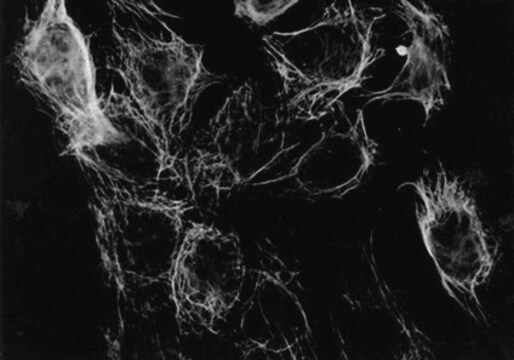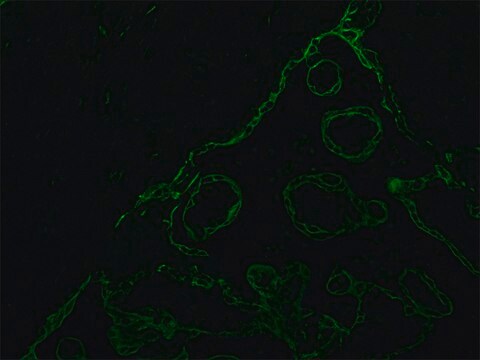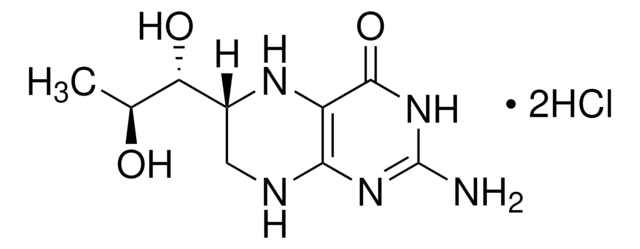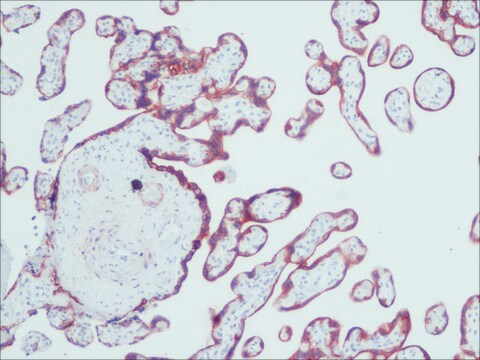推荐产品
生物源
mouse
品質等級
共軛
unconjugated
抗體表格
ascites fluid
抗體產品種類
primary antibodies
無性繁殖
CY-90, monoclonal
包含
15 mM sodium azide
物種活性
wide range
技術
indirect immunofluorescence: 1:800 using formalin-fixed, paraffin-embedded sections of human tissue
western blot: suitable
同型
IgG1
運輸包裝
dry ice
儲存溫度
−20°C
目標翻譯後修改
unmodified
正在寻找类似产品? 访问 产品对比指南
一般說明
Cytokeratin 18 (45 kDa) is the primary type I keratin expressed in simple epithelial cells. Epithelial cells and their derivatives characteristically contain intermediate filaments (IFs) composed of about 20 related polypeptides with molecular weights between 40,000-69,000. Each epithelial tissue has a specific and stable pattern of expression of some of these cytokeratin subunits. Epithelium derived tumors maintain the expression of the cytokeratins found in the normal tissue of origin. Therefore, carcinomas can be identified and classified by immunocytochemical staining with antibodies that react specifically with cytokeratins.
Monoclonal Anti-Cytokeratin Peptide 18 (mouse IgG1 isotype) is derived from the hybridoma produced by the fusion of mouse myeloma cells and splenocytes from an immunized mouse. Cytokeratin 18 (CK18)/keratin 18 is a structural protein and is present in single-layer epithelia. It is located on human chromosome 12q13.
特異性
The antibody reacts specifically with a wide variety of simple epithelia (e.g. intestine, respiratory and urinary systems, liver, and glandular epithelia). It does not react with stratified squamous epithelia (e.g. esophagus or epidermis) or with non-epithelial cells.
免疫原
human epidermal carcinoma A-431 and MCF-7 human breast cancer cell lines.
應用
Monoclonal Anti-Cytokeratin Peptide 18 antibody produced in mouse has been used in:
- immunofluorescence
- fluorescence microscopy
- confocal fluorescence microscopy
- immunolabelling
- histoblots
生化/生理作用
Keratins help to maintain structural integrity. They also control Fas?mediated apoptosis and regulate cell size and protein synthesis. Cytokeratin 18 (CK18) plays a major role in the development of lung cancer. It acts as a therapeutic target for non-small cell lung cancer (NSCLC). CK-18 is considered as a promising plasma biomarker to identify patients with HELLP (hemolysis, elevated liver enzymes, low platelets) syndrome.
免責聲明
Unless otherwise stated in our catalog or other company documentation accompanying the product(s), our products are intended for research use only and are not to be used for any other purpose, which includes but is not limited to, unauthorized commercial uses, in vitro diagnostic uses, ex vivo or in vivo therapeutic uses or any type of consumption or application to humans or animals.
未找到合适的产品?
试试我们的产品选型工具.
儲存類別代碼
10 - Combustible liquids
水污染物質分類(WGK)
WGK 3
閃點(°F)
Not applicable
閃點(°C)
Not applicable
Le Ann Blomberg et al.
Molecular reproduction and development, 73(12), 1491-1502 (2006-08-12)
Gastrulation and trophectoderm elongation of the porcine conceptus coincide with peak conceptus estrogen secretion from gestational day 11 to day 12. The current study aim was to identify genes required for elongation by defining the transcriptome profile of this dynamic
Multipotent progenitor cells can be isolated from postnatal murine bone marrow, muscle, and brain
Jiang Y, et al.
Experimental Hematology, 30(8), 896-904 (2002)
Role of extracellular signal-regulated kinase pathway in RRR-alpha-tocopheryl succinate-induced differentiation of human MDA-MB-435 breast cancer cells
You H, et al.
Molecular Carcinogenesis, 33(4), 228-236 (2002)
Increased plasma levels of CK-18 as potential cell death biomarker in patients with HELLP syndrome
John K, et al.
Cell Death & Disease, 4(10), e886-e886 (2013)
Alexia Nunez-Parra et al.
Chemical senses, 36(9), 771-780 (2011-06-17)
Cell-to-cell metabolic interactions are crucial for the functioning of the nervous system and depend on the differential expression of glucose transporters (GLUTs) and monocarboxylate transporters (MCTs). The olfactory receptor neurons (ORNs) and supporting cells (SCs) of the olfactory epithelium exhibit
我们的科学家团队拥有各种研究领域经验,包括生命科学、材料科学、化学合成、色谱、分析及许多其他领域.
联系技术服务部门






